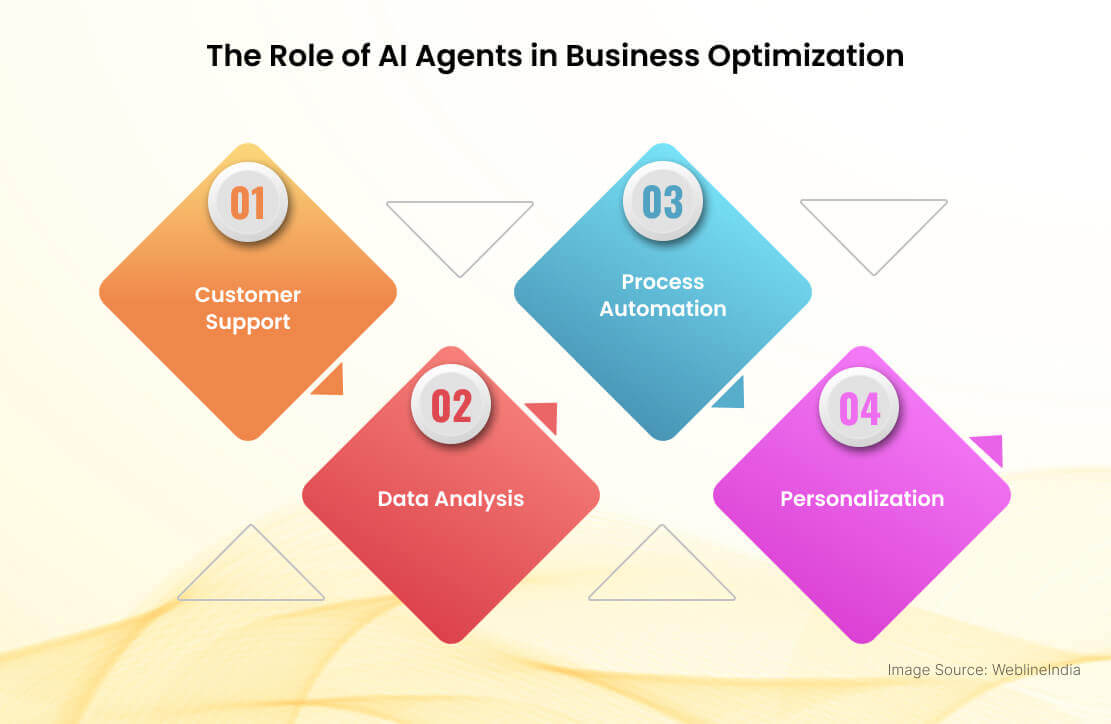Agentic tools today are revolutionizing industries by enhancing automation, improving decision-making, and enabling personalized experiences. Artificial Intelligence has rapidly evolved due to advancements in machine learning and data analytics, enabling businesses to automate processes, enhance decision-making, and personalize customer interactions. This growth has led to digital transformation through AI solutions that drive efficiency and competitiveness across various industries.
From advanced machine learning algorithms to natural language processing, AI-powered ecosystem is driving innovation across sectors like healthcare, finance, and customer service, significantly transforming how businesses operate and interact with customers. AuthorityHacker quotes some of the statistics about Artificial Intelligence:
- 77% of devices being used have some form of AI.
- 9 out of 10 organizations support AI for a competitive advantage.
- AI will contribute $15.7 trillion to the global economy by 2030.
- 63% of organizations intend to adopt AI globally within the next three years.
Curious about how our AI agents can optimize your business operations for greater efficiency and performance?
Taking this forward, in the rapidly evolving landscape of technology, AI agents have emerged as indispensable tools for optimizing business operations. These AI agentic tools are intelligent systems that leverage machine learning, natural language processing, and data analytics to streamline processes, enhance decision-making, and improve overall efficiency.
This article explores the fundamental concepts of AI agents, their functionalities, and how they can transform your business operations.
What are AI Agents?
AI agentic tools are software programs designed to perform tasks autonomously or semi-autonomously. They operate based on algorithms that enable them to learn from data, make predictions, and execute actions without human intervention.
Key Characteristics of AI Agents
- Autonomy: AI agents can operate independently to complete tasks without continuous human oversight.
- Learning Capability: Utilizing machine learning algorithms, they can adapt and improve their performance based on historical data.
- Interactivity: Many AI agents can engage in real-time communication, facilitating interaction with users and other systems.
- Decision-Making: Advanced algorithms allow AI agents to analyze data and make informed decisions rapidly.
The Role of AI Agents in Business Optimization
AI agents serve multiple functions within business environments, driving optimization across various sectors. Their applications range from customer service enhancement to operational efficiency.
Key Applications

1. Customer Support
- Chatbots: AI agents can engage customers through chat interfaces, providing immediate assistance and resolving queries.
- Sentiment Analysis: These agents can analyze customer feedback, helping businesses to gauge customer satisfaction.
2. Data Analysis
- Predictive Analytics: AI agents can process vast datasets to identify trends and forecast future outcomes, aiding strategic planning.
- Business Intelligence: They enable real-time data visualization, facilitating quicker insights for decision-makers.
3. Process Automation
- Robotic Process Automation (RPA): AI agents automate repetitive tasks, reducing human error and freeing up employee time for more strategic activities.
- Workflow Optimization: By analyzing workflows, AI agents can identify bottlenecks and suggest improvements.
4. Personalization
- Tailored Marketing: AI agents can analyze consumer behavior and preferences to create personalized marketing campaigns, increasing engagement rates.
- Product Recommendations: E-commerce platforms utilize AI agents to suggest products based on user behavior and preferences.
Benefits of Implementing AI Agents
- Cost Efficiency: By automating routine tasks, AI agents help businesses save on labor costs and reduce operational inefficiencies.
- Scalability: AI systems can handle increasing workloads without the need for significant additional resources.
- Enhanced Decision-Making: The ability to analyze large datasets swiftly empowers businesses to make data-driven decisions.
Interested in leveraging AI agentic tools to enhance decision-making with data-driven insights and real-time analytics?
Agentic RAG
Retrieval Augmented Generation (RAG) enhances the responses of language models by incorporating relevant data from vector databases, adding context to improve accuracy and reliability. In a traditional RAG pipeline, the query is augmented with data before being sent to the LLM for response generation.
The agentic RAG takes this a step further by using the LLM not only for response generation but also for decision-making. It intelligently determines which data sources to query based on the context of the user’s question. For instance, the agent can decide to pull data from internal documentation for company-specific queries or general industry knowledge for broader questions. If a query falls outside the scope of available databases, the agent can direct it to a failsafe, ensuring more accurate and contextually relevant results.
The agentic RAG approach can be applied in various fields such as customer support, legal tech, and healthcare, allowing for more adaptable, responsive, and intelligent AI systems that understand context and deliver tailored solutions.
Challenges in Adopting AI Agents
While the benefits of AI agentic tools are substantial, businesses must navigate several challenges when integrating these technologies.
Common Challenges
- Data Quality: Poor quality or insufficient data can hinder the effectiveness of AI agents, leading to inaccurate predictions.
- Integration Issues: Incorporating AI agentic environment into existing systems may require significant time and resources.
- Ethical Considerations: Businesses must address concerns regarding data privacy, algorithmic bias, and transparency.
Best Practices for Implementing AI Agents
To maximize the effectiveness of AI agents, businesses should adhere to best practices during implementation.
Strategic Steps
- Define Clear Objectives: Establish specific goals for what you want to achieve with AI agents, whether it be improving customer service or automating processes.
- Invest in Quality Data: Ensure that your data is accurate, comprehensive, and relevant to the tasks your AI agents will perform.
- Select the Right Technology: Choose AI solutions that align with your business needs and infrastructure.
- Monitor and Evaluate: Continuously assess the performance of your AI agents, making adjustments as necessary to enhance effectiveness.
Key Considerations
- Training and Development: Provide employees with training to work alongside AI agents, fostering collaboration between human intelligence and artificial intelligence.
- User Feedback: Incorporate feedback mechanisms to refine AI performance and ensure alignment with user expectations.
- Ethical Practices: Maintain transparency about how AI agents operate and the data they utilize, fostering trust among clients and customers.
The Future of AI Agents in Business
As technology advances, the capabilities of AI agentic tools will continue to expand. Future developments may include enhanced natural language processing, deeper learning capabilities, and more sophisticated integration with other digital tools.
Emerging Trends
- Conversational AI: Improved chatbot technologies that enable more natural, human-like interactions.
- AI in Decision Support Systems: AI agents that provide real-time insights to aid in critical business decisions.
- Hyper-Personalization: AI systems capable of delivering highly personalized customer experiences through advanced data analysis.
Wrapping up
AI agents represent a pivotal shift in how businesses operate, offering innovative solutions to enhance efficiency and decision-making. Organizations can access new levels of productivity and adaptability in an increasingly competitive marketplace through AI software development services customized to their business workflow and functionalities. As we look to the future, embracing AI agentic environment will be crucial for businesses aiming to thrive in the digital age.
Social Hashtags
#AgenticAI #SmartBusinessSolutions #AIForBusiness #FutureOfAI #AI101 #TechSolutions #AIInAction #BusinessGrowthAI
Looking to automate repetitive tasks and significantly reduce operational costs with AI-driven solutions?
Testimonials: Hear It Straight From Our Customers
Our development processes delivers dynamic solutions to tackle business challenges, optimize costs, and drive digital transformation. Expert-backed solutions enhance client retention and online presence, with proven success stories highlighting real-world problem-solving through innovative applications. Our esteemed clients just experienced it.










